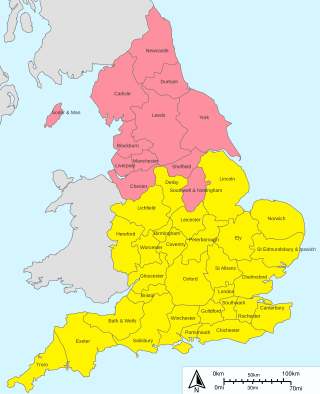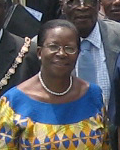
A rector is a senior official in an educational institution, and can refer to an official in either a university or a secondary school. Outside the English-speaking world, the rector is often the most senior official in a university, while in the United States, the equivalent is often referred to as the president, and in the United Kingdom and Commonwealth of Nations, the equivalent is the vice-chancellor. The term and office of a rector can be referred to as a rectorate. The title is used widely in universities in Europe and is very common in Latin American countries. It is also used in Brunei, Macau, Turkey, Russia, Pakistan, the Philippines, Indonesia, Israel and the Middle East. In the ancient universities of Scotland the office is sometimes referred to as Lord Rector, is the third most senior official, and is usually responsible for chairing the University Court.
A running mate is a person running together with another person on a joint ticket during an election. The term is most often used in reference to the person in the subordinate position but can also properly be used when referring to both candidates, such as by saying Joe Biden and Kamala Harris, and Uhuru Kenyatta and William Ruto, were running mates in relation to the presidential elections held in the United States in 2020 and Kenya in 2013 respectively.

The vice president of India is the deputy to the head of state of the Republic of India, i.e. the president of India. The office of vice president is the second-highest constitutional office after the president and ranks second in the order of precedence and first in the line of succession to the presidency. The vice president is also the ex officio chairman of the Rajya Sabha.

This glossary of BDSM terms defines terms commonly used in the BDSM community.
The Cabinet of Ministers of Ukraine, commonly referred to as the Government of Ukraine, is the highest body of state executive power in Ukraine. As the Council of Ministers of the Ukrainian SSR, it was formed on 18 April 1991, by the Law of Ukrainian SSR No.980-XII. Vitold Fokin was approved as the first Prime Minister of Ukraine.

The Province of Canterbury, or less formally the Southern Province, is one of two ecclesiastical provinces which constitute the Church of England. The other is the Province of York.
Pro tempore, abbreviated pro tem or p.t., is a Latin phrase which best translates to 'for the time being' in English. This phrase is often used to describe a person who acts as a locum tenens ('placeholder') in the absence of a superior, such as the president pro tempore of the U.S. Senate, who acts in place of the president of the United States Senate—a position that is held ex officio by the current vice president of the United States. Legislative bodies can have one or more pro tempore for the presiding officer. These positions ostensibly go to legislators experienced in floor debate, who are familiar with the content and application of relevant rules and precedents and who have a reputation for fairness among their colleagues. The phrase is also used to describe officers appointed on a temporary basis, prior to the formalisation of their appointments.
Dean is a title employed in academic administrations such as colleges or universities for a person with significant authority over a specific academic unit, over a specific area of concern, or both. In the United States and Canada, deans are usually university professors who serve as the heads of a university's constituent colleges and schools. Deans are common in private preparatory schools, and occasionally found in middle schools and high schools as well.

The Faculty of Advocates is an independent body of lawyers who have been admitted to practise as advocates before the courts of Scotland, especially the Court of Session and the High Court of Justiciary. The Faculty of Advocates is a constituent part of the College of Justice and is based in Edinburgh.

A dean, in an ecclesiastical context, is a cleric holding certain positions of authority within a religious hierarchy. The title is used mainly in the Catholic Church, the Anglican Communion, and many Lutheran denominations. A dean's assistant is called a sub-dean.
A chancellor is a leader of a college or university, usually either the executive or ceremonial head of the university or of a university campus within a university system.
A pro-vice-chancellor or deputy vice-chancellor (DVC) is a deputy to the vice-chancellor of a university. In the older English universities, and Commonwealth universities following their tradition, PVCs were typically academics who took on additional managerial responsibilities for a limited time, alongside their regular teaching and research. However, in the newer English universities, the post was usually a permanent one, and this is now the increasing trend among older universities also. Individual pro-vice-chancellors may be in charge of areas such as administration, research and development, student affairs, and academic and education affairs. In some universities, there are one or more deputy vice-chancellors subordinate to the vice-chancellor, with pro-vice-chancellor at an executive level ranking below deputy vice-chancellor. PVCs or DVCs are normally empowered to substitute for the vice-chancellor in both ceremonial and executive functions when the vice-chancellor is absent from the university.

The University of Abuja is a tertiary institution in the Nigerian capital, Abuja. It was established in January 1988 as a dual-mode university with the mandate to run conventional and distance learning programmes. Academic work began at the university in 1990 with the matriculation of its pioneer students.
According to both Catholic and Anglican canon law, a cathedral chapter is a college of clerics (chapter) formed to advise a bishop and, in the case of a vacancy of the episcopal see in some countries, to govern the diocese during the vacancy. In the Catholic Church their creation is the purview of the Pope. They can be numbered, in which case they are provided with a fixed prebend, or unnumbered, in which case the bishop indicates the number of canons according to the rents. These chapters are made up of canons and other officers, while in the Church of England chapters now include a number of lay appointees.

Olivia Nyembezi Muchena is a Zimbabwean politician and the former Minister of Higher Education in the Cabinet of Zimbabwe. She has also served as the Minister of Science and Technology Development and as the Minister of Women's Affairs.
Precedence signifies the right to enjoy a prerogative of honor before other persons; for example, to have the most distinguished place in a procession, a ceremony, or an assembly, to have the right to express an opinion, cast a vote, or append a signature before others, to perform the most honorable offices.
Academic ranks in the United States are the titles, relative importance and power of professors, researchers, and administrative personnel held in academia.
Academic staff, also known as faculty or academics, are vague terms that describe teachers or research staff of a school, college, university or research institute.

Academic ranks in the United Kingdom are the titles, relative seniority and responsibility of employees in universities. In general the country has three academic career pathways: one focused on research, one on teaching, and one that combines the two.








